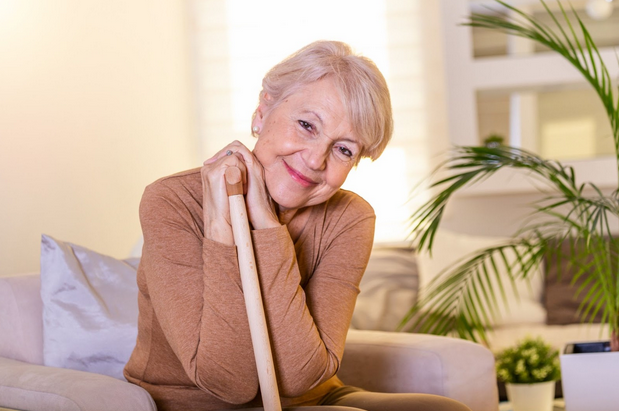
Cane? Walker? Rollator? – Which Walking Assist Product is Right for My Loved One?
It’s nice to think that we might walk our way into the proverbial sunset, but it’s more likely we will be using some kind of gait aid to get there. For our loved ones who want to remain in their homes independently, a walking aid can be the key to aging in place. If you feel like your loved one could use a little help to remember to use their walker and be safe in their home, call Visiting Angels of Matawan at (732) 671-2899 to find out more about our professional caregivers.
Helping Your Seniors Stay on Their Feet
There are a variety of walking aids to keep your loved ones safely upright and moving, with the most common being canes, standard aluminum walkers, and wheeled rollators. The most important thing is that they feel comfortable adopting and using the aid on a daily basis. No product is useful if it is sitting in a corner untouched.
Canes
Canes are perhaps the most common and standard type of walking aid a senior is likely to use. By the time most of us reach our 70s, our balance will start to falter, and a cane can really help stability while reducing strain on the legs. It’s also an easy, portable device to keep around. Most canes come in a standard length of 36 inches, which can be adjusted to the user’s needs.
If your loved one ever feels at risk of falling, a cane can be very useful as a non-intrusive device that still allows for a lot of independence. Canes help to support the body’s weight and help transfer some of the load from the legs to the upper body.
Features to Consider with a Cane
Base – single contact or quad base
The single contact with the ground helps those with early balance problems, who need just a little support to steady themselves and don't need to push down a lot on the cane.
The quad cane, with its four-pronged base, is for those who need a wider base of support for balance. But there's a trade-off. A quad base is heavier and clunkier to use, and the user must be sure that all four points are hitting the floor every time.
Handle – rounded, T-shape, or offset
With any cane’s handle, you'll want the right height, where the top of the cane comes to your loved one’s wrist with their elbow bent at a 10- to 30-degree angle. Any taller or much lower might throw off the mechanics of how your loved one walks. Two more considerations when deciding on the right type of grip: comfort and the amount of weight they will be putting on it.
A rounded handle will work great for someone who isn’t putting a lot of weight on the cane, but if they have to really grip and lean hard, the curved handle will hurt their hand.
A T-shaped or horizontal grip allows for even distribution of weight across the palm and is especially kind to those who have arthritic hands or fingers.
With its unique shape – similar to a question mark or shepherd's staff – the offset handle’s transmission of force is directly perpendicular to the ground, which puts your loved one’s weight directly over the cane shaft for more comfort when walking.
Standard Walkers
Two-wheel (or front-wheel) walkers are the most common, with wheels in the front and posts in the back. The biggest benefit of these walkers is they are very stable and a good choice for a person with a more severe balance problem, such as Parkinson’s. However, as these require someone sometimes to lift and push the equipment, these would not work well for someone with cardiac or lung disease or an elder with upper body weakness.
Rollators
Rollators can be easier to use because they have wheels at the bottom of each leg. They usually have brakes on the handles, which does require good coordination on the part of your loved one.
Features to Consider on Rollators
Three Wheelers
Three-wheeler walkers are a little like a tricycle, with one wheel in front and two in back. They're pretty easy to maneuver but less stable than two-wheel walkers and don't provide as much support for overall balance or weakness. While some people may prefer these because they fit in smaller spaces, the three-wheelers do cause users to lean farther forward.
Four Wheelers
Four-wheeler walkers are wider than three-wheelers and are usually easier to push over uneven surfaces, such as sidewalks. They usually have a seat with a basket underneath to hold groceries or personal items, which makes them ideal for elders who have decreased endurance or who get short of breath. When considering either style, make sure that your loved one fits within the maximum weight limits of the rollator.
If your loved one is needing help from a walking aid, it may also be time to look for a caregiver to ensure they can live independently as long as possible. Oftentimes, it’s not a far ride from a walking aid to fall. Call Visiting Angels of Matawan at (732) 671-2899 to set up a free consultation for your family today. Also, ask about our Safe & Steady Fall Prevention Program.
